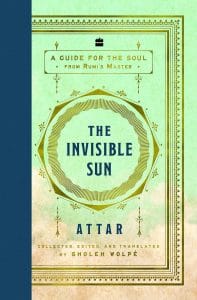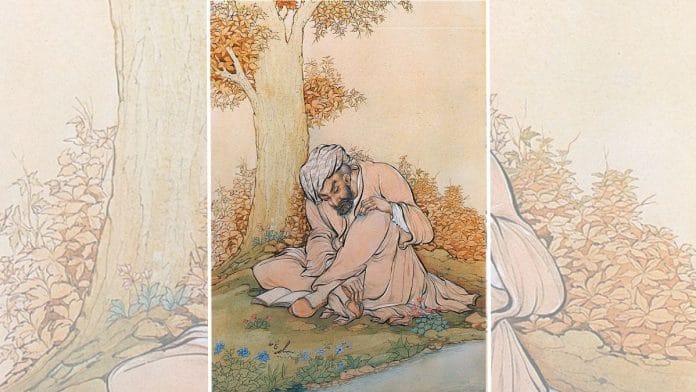I love that Attar refuses to pander to our egos or sugarcoat the wisdom he offers. He points directly at our delusions, misconceptions, and overinflated self-regard so we can begin our Wayfaring journey immediately and without self-deception. He repeatedly warns against the soul’s greatest enemy, the ego-self, which he calls “that cyclone of calamities.”
If the Almighty embraces you,
you’ll catch fire with joy.
This is how it works,
not in the topsy-turvy way you imagine.
Narcissists don’t get this.
Attar’s wisdom has changed my own life. He has lifted me from the prison yard of the world to a place I never imagined possible. Whether you devour this book from cover to cover or open it at random for guidance or inspiration, Attar’s words will speak to you in the language of the soul.
If you come sad and frozen to this book,
its invisible fire will flare and melt your ice.
They are like a mystery under a veil
that reveals its beauty slowly.
Kill your fear. Step forward.
Leave faith and blasphemy behind.
Don’t worry. Don’t be naive. Don’t hesitate.
Take the first step.
Also read: Shah Rukh Khan said to Vir Das: ‘Show me what you’ve got’
Who is Attar?
Attar (CE 1145–1220) was born in Nishapur, a city in the northeast region of Iran. “Attar” means perfume maker, which at the time also referred to interpreter of illnesses and dispenser of remedies. In today’s lingo, he was a pharmacist.
He earned a living as a healer so that he would never have to seek a position in the royal court as a poet, as they were traditionally obliged to flatter their patrons.
I thank the Almighty I’m not a courtier,
free from such a degrading profession.
I haven’t tasted a single bite from a tyrant’s table,
nor do I have a patron for my books.
The circumstances of his death are the subject of much speculation. Some believe he died a violent death in the massacre Genghis Khan and the Mongol army inflicted on the city of Nishapur in 1221 CE. However, there are stories about the circumstances of his death that are perhaps more lore than fact.
In one such story, when the Mongol invaders are outside the city gate, Attar grabs his sword and rides out to meet them in battle. When his head is cut off, he simply picks it up and continues fighting.
In another version, Attar is taken prisoner by a Mongol soldier. A man comes along and offers a silver coin for Attar’s release, but Attar advises his captor against selling him so cheap. The soldier’s eyes glint with greed, and he refuses the sale. Soon, another buyer offers a gold coin. Again, Attar advises his abductor not to sell. The soldier refuses that sale as well. Finally, a man with a donkey sees Attar in chains and offers the soldier a sack of straw in exchange for the elderly poet’s life.
Attar then says: “Now you have been offered what I am truly worth.” Upon hearing this, the angry soldier picks up his sword and beheads Attar with one swoosh.
Attar’s philosophy and poems have influenced many great philosophers, mystics, and poets, including Rumi. Forty books bear Attar’s name but only seven are verifiably his. The poems in this book are drawn from his verified books.
Today, Attar’s mausoleum stands in Shadiakh, one of the main palaces of old Nishapur in Iran. He is revered as one of the great Sufi mystic masters of all time.
 This excerpt from ‘The Invisible Sun’ by Sholeh Wolpé has been published with permission from HarperCollins Publishers.
This excerpt from ‘The Invisible Sun’ by Sholeh Wolpé has been published with permission from HarperCollins Publishers.






